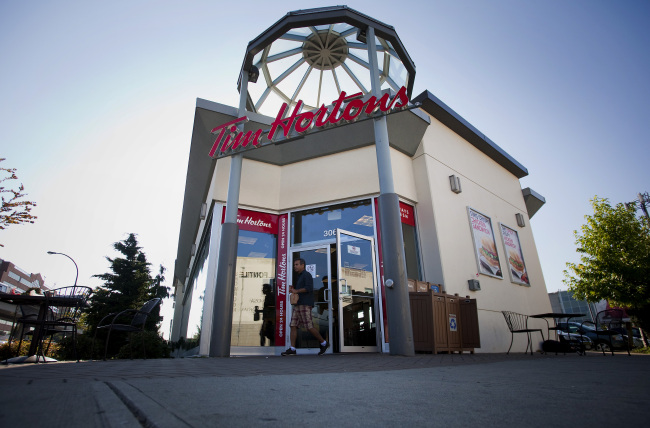NEW YORK (AFP) ― Burger King is buying Canada’s Tim Hortons coffee-and-donuts chain in an $11 billion deal that raised concerns about another U.S. company moving abroad for tax advantages.
Burger King Worldwide denied that the deal announced Tuesday, which would create the world’s third-largest fast-food company, was being undertaken for tax reasons.
But the planned move of the “Home of the Whopper” headquarters from Florida to Canada, which could cut its corporate tax bill, sparked calls for boycotts from consumers and objections on Capitol Hill.
Burger King will pay $11 billion in cash and stock for Tim Hortons, based on the closing share price Monday.
The deal, backed by legendary investor Warren Buffett, would create a giant of the quick-service restaurant industry with $23 billion in sales and more than 18,000 restaurants in 100 countries.
That would propel the as-yet unnamed new company to No. 3 worldwide in sales after McDonald’s and Yum!, owner of Pizza Hut, Taco Bell and Kentucky Fried Chicken.
“By bringing together our two iconic companies under common ownership, we are creating a global QSR powerhouse,” said Alex Behring, executive chairman of Burger King and managing partner of 3G Capital, Burger King’s majority owner.
“This is not a tax-driven deal, this transaction is fundamentally about growth and the focus is on creating value through accelerating international expansion for both brands,” Behring said in a conference call.
 |
A customer exits a Tim Hortons in downtown Vancouver, Canada. (Bloomberg) |
Burger King’s effective tax rate “is currently in the mid- to high 20s, which is pretty much in line with the current effective rate in Canada,” he added.
Daniel Schwartz, Burger King’s 34-year-old chief executive who would be CEO of the new company, acknowledged the deal is a tax inversion.
But, he said, “We don’t expect there will be meaningful tax savings, nor do we expect any meaningful change in our tax rate.”
Under the combined company, the two brands would continue to be managed separately from their current headquarters: Burger King in Miami and Tim Hortons in Oakville, Ontario.
Tim Hortons, Canada’s dominant fast-food chain, operates 3,630 restaurants across Canada, and 1,000 in the U.S. and Middle East. The tie-up would give it access to Burger King’s larger footprint in 98 countries and territories worldwide.
In the deal, Brazilian-controlled 3G Capital will convert its roughly 70 percent equity stake in Burger King to a 51 percent shareholding in the new company.
Burger King said it had lined up $12.5 billion in financing for the deal.
That includes $3 billion from Buffett’s Berkshire Hathaway for preferred shares; Berkshire will not take part in the management.
Berkshire and 3G partnered in the takeover of ketchup maker HJ Heinz last year.
The transaction is expected to close in late 2014 or early 2015, pending approvals by Tim Hortons shareholders and U.S. and Canadian antitrust regulators.
Shares would be traded in New York and Toronto.
Burger King shares closed down 4.3 percent at $31.00 and U.S.-traded shares of Tim Hortons surged 8.5 percent to $81.05.
The two companies explained that their corporate headquarters will be in Canada because the country is “the largest market of the combined company.”
The planned merger is the latest in a wave of controversial tax-inversion deals, in which a U.S. company relocates its statutory headquarters outside the country to take advantage of lower tax rates.
U.S. President Barack Obama and his administration have called on Congress to close the tax loophole.
Response to Tuesday’s merger announcement on Capitol Hill was swift.
“@BurgerKing wants your money. Now they want you to pay their taxes too. Time to ditch the Whopper?” tweeted Chris Van Hollen, the top Democrat on the House of Representatives Budget Committee.
Conservative House Republican Matt Salmon tweeted, “The news of Burger King’s move to Canada ought to motivate us to take a serious look at how we do business.”
Angry comments peppered Burger King’s Facebook page.
“That’s it burger king, never EVER will I buy from you. If you can’t be an AMERICAN and pay taxes like the rest of us working stiffs who buy your burgers, then you’re a fake and unpatriotic,” wrote one commenter.




![[Breaking] Assembly passes motion to revoke martial law](http://res.heraldm.com/phpwas/restmb_idxmake.php?idx=644&simg=/content/image/2024/12/04/20241204050007_0.jpg)



